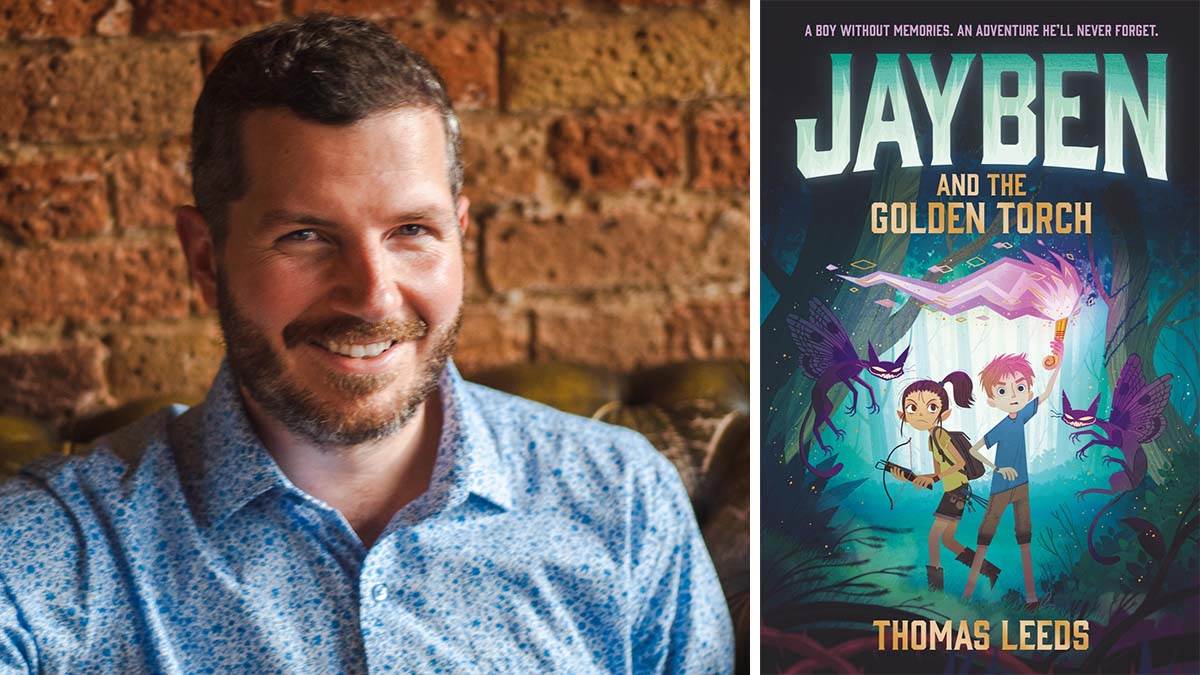The importance of characters with epilepsy and memory loss in children's books
Published on: 05 April 2023
Jayben and the Golden Torch author Thomas Leeds has personal experience of looking for fiction starring characters who have epilepsy and memory loss.
Here, he shares his thoughts on ensuring every child can see themselves as the hero of a story.

Since I woke up after my brain injury 20 years ago, it's been really encouraging to see what progress has been made on more forms of disability being positively represented in books.
As I learned to live with memory loss and epilepsy caused by my brain injury, I rediscovered the magic of reading and I fell in love with stories set in fantasy worlds, where the heroes were confronted with the unknown. It was the closest I could get to seeing myself on an exciting adventure, because when you have memory loss, the real world is a mysterious place.
But no matter how alien their surroundings, the heroes I loved never forgot their names. They always knew what they'd done yesterday. And their quests were never rudely interrupted by seizures, forcing them to rest for many hours. No matter what they'd overcome or how impressive their victories, they all got there without my particular difficulties. When you live with a disability or illness that matters, especially in childhood.
For all the brilliant non-fiction resources there are to help a child cope with a brain injury and epilepsy, I believe they need help through fiction just as much.
They need to see their difficulties faced by strong characters in stories that are not about the fact that they're disabled – books that any of their friends might enjoy just as much.
On my journey to recovery, I realised that I had a great imagination and I loved coming up with stories. Then I learned that, before my accident, I loved writing. Though I had no clear memory of this, it made sense and I dared to dream of being an author someday. But my brain injury had stopped me reading and writing and, between my unreliable memory and my seizures, achieving this dream seemed completely impossible.
At the same time, I got to know a boy who was also living with epilepsy, caused by cerebral palsy. Like me, he was a big fan of wild adventure stories, and he shared my hope of one day seeing a brave hero living with seizures.
'If something is not impossible, then you can do it'
For years I had no memory of my childhood. Then one day I heard a song from the 1980s, the decade I was born, that I somehow had not heard since my accident. And it finally happened – a whole series of childhood memories came flashing back. It felt like the closest thing to magic. It changed everything. I finally had something from the beginning of my story, and it lit a flame inside me.
The idea for my book Jayben and the Golden Torch came exploding into my head and I've never felt so compelled to do something. I had to write it.
But could somebody like me, with such a terrible memory, really write a book? It seemed almost impossible, but not quite. And if something is not impossible, then you can do it.
This quickly became my mantra and fuelled my fierce determination to become an author and to finally give the world a hero with a brain injury and epilepsy.
Writing about a character who has seizures and memory loss
Jayben is a boy from this world who wakes up with no memories in a fantasy elven world. He longs to find out who he is and where he's from, but he has a great power, locked up with his memories, and a magical torch in his pocket. This makes him the only person who can save the world from an evil villain called Null, who is wiping everyone's memories.
Jayben is thrust onto a perilous quest to find the one thing that will jog his memories and unlock his power. On his epic journey he faces fierce beasts and a powerful witch, and he suffers seizures along the way. He soon learns the value of friendship and he proves to himself that in spite of his disability, he can be the hero.
It's so important to me that there are blank pages in the book, every time Jayben has a seizure and forgets a period of his life. It's a great way to show the reader how it feels to unexpectedly lose control at any moment and lose a chunk of information, having to rely on good friends to fill in the gaps and support you.
Jayben shows the confusion, fear and frustration that I feel after a seizure, but in doing so, he shows how amazing he can be when he does have control. He's still there on the next page. He can still be the hero.
I hope that children living with brain injuries and epilepsy will feel encouraged by Jayben, the hero I've longed to see for many years. But I believe that his story, the first in a series for ages 9+, is for everyone, and its message of courage and hope will appeal to readers of all abilities.
Jayben and the Golden Torch will show all children that whatever your story, you can be the hero.
Jayben and the Golden Torch by Thomas Leeds is out now.
Read our review
Author: Thomas Leeds
A curious, immersive fantasy with complex world-building, engaging characters and quirky creatures. Ideal for readers who enjoy an exciting adventure with added depth and intensity.
Booklist
Books about epilepsy and seizures
We've put together a list of more books that feature characters who experience epilepsy and seizures.
Topics: Disability, Inclusive, Features







